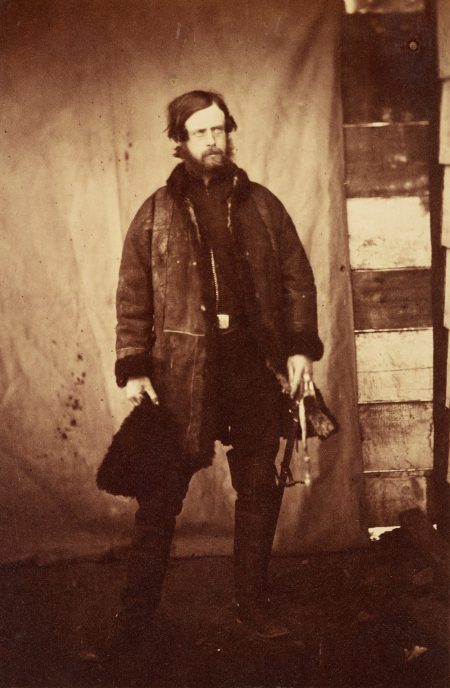Possibly the earliest visual record of shell shock, the above photograph shows a Crimean War infantry captain whose eyes appear as windows to a hollow, desperate soul. Two years later, he died from the hardships of war shortly after returning home to Britain.
In a similar manner about 150 years later, “Sgt. Will Gardner,” a 125-minute movie to be released Jan. 11, creatively addresses contemporary American veterans’ hardships and governmental neglect of former soldiers. Augmenting the long historic continuum of artistic illuminations of war’s horrible mental consequences, this moving psychological drama sweeps viewers into the troubled mind and dismal life of an Iraq War veteran haunted by horror and regret. A fictional modern counterpart to Lord Balgonie, Sgt. Will Gardner (played by Max Martini, who also directed and wrote the film) suffers with a traumatic brain injury and post-traumatic stress that render him barely able to survive after returning home.
From its beginning sequence, “Sgt. Will Gardner” elaborates the dire impact that a mental impairment can have in rapidly unraveling every aspect of one’s life. This movie’s social message and potential application to reality are akin to that of a docudrama, while its cinematography conveys an experiential, dazelike feeling. Staged in a manner that should appeal to pro- and anti-military viewers alike, it’s as much a war movie as it is the tale of a broken man who can accomplish nothing. An alcoholic vagrant who can’t find a job, much less hold one down, Gardner has lost everything. The carnage has followed him home via intrusive past moments that won’t go away. Confusion, sadness, frustration, anger, and guilt are palpable in loose disjointed sequences whose fragmented format symbolically mirrors the dreamlike life of a drifter floating from one scenario to the next.
Dialogue is often weak, with maudlin lines seeming unanchored to larger significance. Even so, the movie manages to exude an attitude of overall sincerity while making its point. One never doubts that a man like Gardner could exist.
The action-packed opening scene introduces Gardner as a homeless squatter having locked himself inside some apartment bathroom. So far gone is Gardner’s mind that he is insensible to what is happening as the cops break down the door and arrest him. He might as well be back in Iraq as flashbacks return him to a fateful night on the front line where a decision he made led to his comrade’s shooting.
Aside from prima facie gleanings, we never really learn much about Gardner’s background; his past seems lost in his current state of apathy. Everyone calls him “Ghost,” a nickname he supposedly acquired because “no one sees me comin’.” Symbolizing his status as a shadow of the man he once was, the moniker confers upon his character an aura of anonymity, underscoring his loss of former self. “Now the fighting’s over, but it’s like I never came home,” he tells his onetime army buddy Samuel (Omari Hardwick), who frequently acts as a sounding board for his frustrations. A mystic mentor whose true significance becomes apparent later on, Samuel is always there to provide him with a voice of reason and a shoulder to cry on.
Others aren’t so sympathetic. Following a run-in with a parsimonious landlord who reneges on paying him for odd jobs, Ghost steals his motorcycle and embarks on a cross-country journey in search of emancipation from his personal quagmire.
It’s unclear how much time has elapsed since Ghost returned from Iraq, but it’s been a while since things spiraled out of control. Samuel tries to help him regain a sense of purpose, which proves arduous, as some of the most important aspects of his former life have already passed him by. When he meets his family in Albuquerque during his motorcycle trip, his son barely recognizes him; and his wife is living with another man, though she professes to still love Ghost. Their tenuous interactions bring out hardships faced by soldiers’ families.
Meanwhile, Ghost is buoyed by the presence of a new woman, Mary-Anne (Lily Rabe), an eccentric former office drudge on the run from her dehumanizing cubicle life. The delinquent veteran thinks he’s in love; but Mary-Anne is only attracted because she believes him to be Bryan Cranston, a TV star. Naturally, both are in for disappointment. While Mary-Anne is out, Ghost rescues a vagrant Marine amputee named Charlie (Luis Bordonada) from robbers, and brings him back to her hotel room for drinks. When Mary-Anne returns horrified to find her room usurped by the two drunken men, Charlie brandishes a gun and threatens to shoot her.
Despite all this, Ghost sympathetically forgives his new friend and escorts him to his father’s grave at the Arlington National Cemetery. At last, the horizon betrays a glimmer of hope. Having met Charlie and other homeless former soldiers sparks his larger ambition to somehow help fellow veterans. But the dilemma at the heart of this story remains: how can he assist others if he can’t even ameliorate his own destitution? A jarring ending leaves you with feelings of emptiness.
The total film incisively questions the priorities of our government that is constantly recruiting and deploying new enlistments while overlooking its former soldiers. Directorial agenda is transparent, advocating certain veterans’ assistance charities. That veterans should need charitable assistance only bolsters the movie’s purport.
“Sgt. Will Gardner” will appeal to a wide range of viewers, from traumatized combat veterans and their relatives, to war movie aficionados looking for something more sensitive than the usual heroic fare, to anti-militaristic souls intrigued by war’s lesser-discussed pitfalls. Anyone interested in better understanding how invisible injuries can affect a person psychologically should consider taking in this entertaining fictional case study.
–Annabel Osberg
“Sgt. Will Gardner” will be released Jan. 11 in theaters and video on demand. Watch the trailer here: https://youtu.be/6cJZ535DOhY





